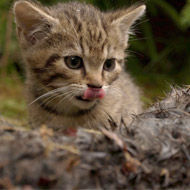
Conservationists reveal plan to establish new population in Galloway Forest
A plan to reintroduce the wildcat into the English-Scottish border region, creating a new British population, has been launched by conservation group Wildcat Haven.
The British Wildcat Project aims to create a new population of wildcat in south-west Scotland, which will be encouraged to spread across the border into Cumbria and Northumberland. If the project is a success, it will be the first time wildcat have been present in England since they were hunted to extinction 300 years ago.
“The British ecology needs a wildcat in it,” explains Dr Paul O'Donoghue, chief scientific advisor with Wildcat Haven. “Wildcats fit in perfectly, helping to control species like rabbit and actively avoiding conflict with humans.
“The Highlands can't afford to lose any Scottish wildcats so we'll be looking to healthy, wild-living European populations, and using them to re-establish a British wildcat population on both sides of the English-Scottish border.”
The population of wildcats will be initially introduced to Galloway Forest, a remote area in south-west Scotland. The forest offers a mixture of natural and commercial connectivity that stretches to Kielder Forest in Northumberland.
Conservationists say wildcats can thrive in man-made forests, and therefore an important part of their research will be understanding how to create a sustainable population in such an environment.
The plans have been welcomed by Gresham House Forestry, one of the largest owners of forestry in the UK.
Director of forestry, Jason Sinden, comments: “Gresham House manages almost 140,000 acres of forestry assets in the border region. These forests are managed to produce a sustainable supply of timber and this helps to create almost ideal habitats for a range of native woodland specialists, such a red squirrels, badgers and roe deer.
“The forests are now being re-colonised by pine-martens and we hope that the habitat can also be suitable for the wildcat, which is such an important component of forest ecosystems. We will be working with Wildcat Haven to identify appropriate sites for release and monitoring.”
Image (C) Wildcat Haven



 The veterinary mental health charity Vetlife is inviting the veterinary community to join it for a sponsored cold-water dip.
The veterinary mental health charity Vetlife is inviting the veterinary community to join it for a sponsored cold-water dip.